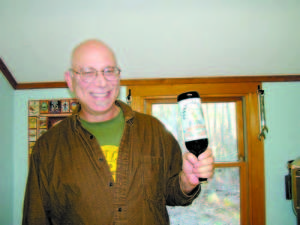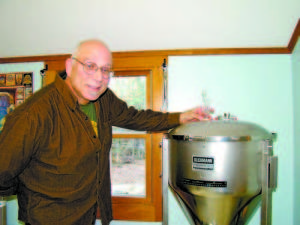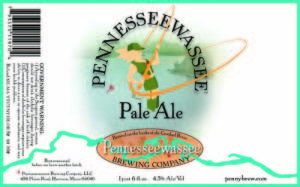Pennesseewasse Pale Ale debuts

COLLECTOR’S ITEM? — Harrison brewer Lee Margolin got a good laugh after he demonstrated his hand-rolling method for affixing the label of his new brew, only to realize he’d placed the label upside down. (Geraghty Photo)
By Gail Geraghty
Staff Writer
HARRISON — Twenty-two years of home brewing will be put to the test Friday night, Nov. 23, when Tucker’s Pub in Norway holds a release party for Pennesseewassee Pale Ale, the first beer produced by the new Pennesseewassee Brewing Company of Harrison.
For the first time, folks will be tasting Lee Margolin’s favorite home brew recipe, a naturally-carbonated, tawny-colored, light-tasting traditional English Pale Ale. He’s bringing over five or six cases of the beer, all hand-labeled in 22-ounce craft bottles from his brewery, produced, as its label states, “on the banks of the Crooked River.â€
If strangers pronounce his beer good, if they come back for more (although one 22-ounce beer, at 4.5% alcohol, should give anyone a good start), then Margolin will know all the effort he has put into the past year and a half to obtain the necessary regulatory approvals and licensing has been worth it. As many times as friends have told him they love his beer, in the life of a professional micro-brewer, it’s the opinion of savvy beer drinkers that matters most.
“I got lots of real encouragement,†he said, when he brought his ale in a keg to a recent Harvest Party in

FERMENTOR MAKES IT HAPPEN — All Lee Margolin needs at this point in his micro-brew business is a small sanitized room off his kitchen to house his brew pot and this fermentor, where it takes around two weeks for the pale ale to mature and realize its tawny color and light taste. (Geraghty Photo)
Otisfield, attended mostly by people he knew. However, “As a scientist, I have to discount my first circle,†said Margolin, who has a Master’s Degree and Ph.D in biology.
Don’t expect him to get all stressed out on Friday, in any case. Just as likely, he’ll be up on stage with A Bunch of Old Hippies, playing blues harp with the fellow members of his band. That’s because Margolin knows he’s riding a wave, in which locally-produced craft beers are becoming ever more popular; and it’s because he knows Pennesseewassee Pale Ale fills a void for a beer that’s local to the Oxford Hills and western Maine. Nationally, the number of craft brewers has gone from eight in 1980 to over 1,600 in 2010. Nowadays, it is said, the majority of Americans live within 10 miles of a brewery.
It’s the water
If riding a wave, like Bray’s Brewpub has in Naples and Geary’s, weren’t enough to ensure success, Margolin can also boast that his Harrison beer has a very special edge — the water.
“We have the best water in the world,†Margolin said, of the aquifer under his Plains Road home, located within 200 yards of the Crooked River. “That’s what I think is going to be the success of this thing. The waters are very unique.â€
Margolin and his wife Lisa Moore and their boys have drunk the water since moving to Harrison around 15 years ago; they knew it tasted great, “but when I got the test back from the state, I understood why.†The water is purified in its passage through an old glacial moraine of sand and gravel — “The largest natural filter you

“PENNY†GOES ‘A FISHIN’ — Lee Margolin’s Pennesseewassee Pale Ale uses groundwater from the huge sand and gravel aquifer under his home “on the banks of the Crooked River,†near Bolsters Mills in Harrison. The depiction of the lake is from an actual painting of Pennesseewassee Lake in Norway, designed to identify with the physical features of the Oxford Hills. Pictured is a draft label; state rules require that the final label on his 22-ounce bottles also list the amount as “1 pint, 6 ounces.†(Geraghty Photo)
can imagine,†Margolin said. The Crooked River, one of Maine’s few “Triple A†highest-classified rivers, is great testament to the purity of the underlying aquifer, he said; so much so, that he originally wanted to call his brewery “Crooked River Brewing.â€
Alas, someone in Cleveland, Ohio, had already patented the name, inspired by the Cuyahoga River, which means “Crooked River†in the Pawnee language. All beer has four basic ingredients — water, malt, hops and yeast — and water makes up 90% of its contents. “The water is as important an ingredient as my choice of hops and malt,†he said. Home brew supply stores commonly sell bottles of minerals or salts designed to imitate the mineral content of rivers in Europe that were the mainstays of famous brews that live on today, such as Bass Ale, he said.
Last Saturday, Margolin gave a tour of the small space off his kitchen that he renovated for his brewery. Everything, from the linoleum floor to the brew pot at one end and the fermentor on the other, is sparkling and sanitized. It’s an environment in which he’s well familiar — until January of 2012, Margolin worked for many years as Director of Research and Compliance for FHC, Inc. in Bowdoin, a neuroscience medical device company.
“It’s really funny, but strangely, the process of getting a license to be a brewer was as stringent and as complex, as nonintuitive and time-consuming as the work I did there,†Margolin said. He notes that each year there are literally thousands of people who apply for a home brewer’s license; many drop out along the way. He wondered whether the many regulatory hurdles may have been part of the reason behind the demise of the Mt. Henry Brewing Co., whose partners began and then backed off several plans in recent years to open a brewery in Bridgton.
Margolin’s licenses allow him to brew Pennesseewassee Pale Ale on the premises, but no sales can take place from his home. Home brewers are allowed to make 200 gallons of home brew a year; he showed a ledger he’s kept to track the ingredients and processes used for each test batch of home brew he’s made for the past 22 years. “I shared a lot with friends, made a bunch of test batches,†before settling on his ideal brew, he said.
Now that he’s gone professional, Margolin is starting out small. He brews about 15 gallons per batch, and makes two batches per month, doing everything by hand. “I put on the label by hand, I wash the bottles by hand, I put on the cap by hand and I hand-deliver the bottles,†he said. “And then I’ve got to collect the bottles.â€
If the business takes off, he’ll expand. Right now, Pennesseewassee Pale Ale is available in Norway at Tucker’s Pub, the Fare Share Market and 76 Pleasant Street. The Village Tie-Up in Harrison will also sell the beer, as will the Smiling Moose in South Paris. The price, is said, “is comparable to other offerings that come in craft-size bottles.†He welcomes invitations from others who’d like to try selling the brew; e-mail him at info@pennybrew.com
“I’ll go where it takes me,†said Margolin of Pennesseewassee Brewing Company. “I want this to evolve in an organic, natural way.â€
Â
   Â

